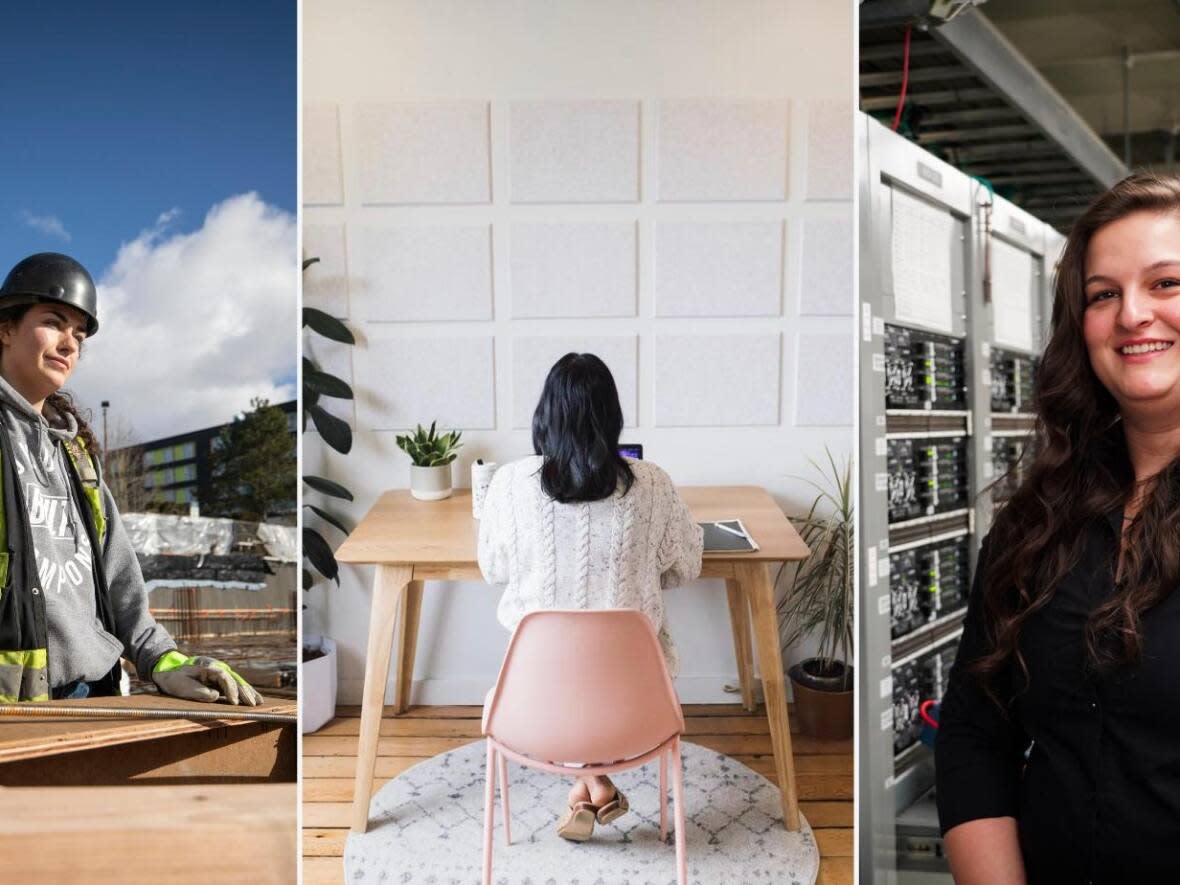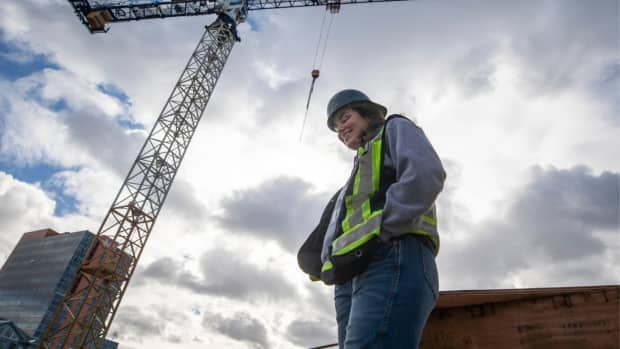Flexible workplaces and mentorship are helping these B.C. women reach new heights

For many women, trying to break into industries traditionally dominated by men or start their own businesses hasn't been easy. Those who have managed it say flexible and inclusive work environments and mentorship programs have been key to their success.
From construction to aerospace, these women say the added support can go a long way toward reducing gender biases and help balance careers and home life.
Here are some of the B.C. women breaking workplace barriers and pushing for programs and incentives aimed at encouraging more women in their fields.
Isabella Lopes, crane operator
Isabella Lopes climbs a ladder to what she calls her second home — a tower crane currently rising 55 metres into the sky.
"I love the big, busy, push days. I enjoy the responsibility and the liability aspect," said Lopes, the youngest full-time crane operator at her worksite in Surrey, B.C.
Lopes, 22, is currently helping construct a residential building. She's responsible for pouring concrete for the building's foundation, lifting and moving heavy materials like steel rods and inspecting the machine daily to make sure it's safe.
WATCH |A sneak peek at the workplaces of 3 women making it in unconventional jobs:
Lopes says she was inspired to operate cranes after working at a construction site shortly after high school, but she says the men in her life, including parents of friends who worked in the trades for decades, worried she would face harassment in an industry dominated by men.
"I didn't know how to read a measuring tape when I first got into construction … I think they were concerned about that transition for me as well, and how I'd be treated."
When she first started in construction, Lopes recalls instances where men were afraid to let her fully participate in physical or dangerous activities "they deemed unfit for a woman to perform."
However, Lopes says she also found co-workers who were supportive.
"I could always pinpoint who was willing to teach and hover above their shoulder until they told me to go away."
The acceptance and mentorship cemented her career path.
"I have had nothing but support from the people that I work with. And I find this industry is actually very open to women, she said of her life at work."
Lopes says she hopes more women consider a career in trades.

Number of women in trades rising
According to the Ministry of Post-Secondary Education and Future Skills, there has been more than a 9.4 per cent increase in the number of female apprentices in B.C. across all trades since 2018.
Since then, the ministry says there has also been a 29 per cent increase in the number of female apprentices in trades where women have been historically underrepresented, such as the construction, electrical, carpentry, and plumbing trades.
However, challenges for women in trades still exist, such as inadequate and unsanitary washrooms on worksites and inaccessible child care, according to Sarina Hanschke, lead organizer with the Laborers International Union of North America.
"There's a lot of, you know, people that struggle on how to take care of the kids. And not everybody has the luxury of having, you know, friends and family to help look after the kids."
Chelsea Gill, air traffic management
Chelsea Gill, 26, works as an air traffic management technologist with NAV Canada. Her job is to ensure equipment is running smoothly so pilots can communicate with air traffic controllers and navigate the sky safely.
The facility in Surrey is filled with radios, radars and air traffic controllers focused on their screens.
"Our number-one job is to respond if there's anything that is broken ... We need to fix it, and we need to do it as soon as possible," said Gill.

Gill says she was inspired to become a technologist with NAV Canada when the organization made a presentation to her graduating class in the Telecommunications and Networks, Electrical and Computing Engineering Technology program at the British Columbia Institute of Technology.
Eventually, Gill became the first woman in the maintenance and installation departments at NAV Canada and is grateful for being part of a "very inclusive team" that she says respects and treats her as an equal.
The aerospace and aviation industry continues to be male-dominated, with a workforce that is only 30 per cent female, including administrative positions. Specific occupations within the field have even fewer women, with only six per cent of mechanics and seven per cent of pilots being female, according to a 2018 report from the Canadian Council for Aviation and Airspace.
"I do always strive to be the best because you never want there to be any reason that someone can discredit you for being a female. So you'd have to work twice as hard just to make sure people view you as the same."
Gill says she is part of the new women's committee for her union, with the goal of getting more women into the industry.
"I hope women and young girls everywhere look at technology as … a career path they could aim for," said Gill.
Elizabeth Fisher, businesswoman
As a new mother, Elizabeth Fisher recalls opening up a non-profit company to provide healthy snacks for at-risk youth, working from a makeshift office in the closet underneath her stairs, feeling isolated and struggling with her mental health.
Providing flexible child care was the goal and her dream when she opened OneSpace, a female-led co-working space in East Vancouver, in 2021, that provides workspaces, child care, and mental health services under one roof.
"Equity is creating a space that's intentionally designed for women to meet their needs in order for them to thrive," said Fisher.

The space now has about 100 members and is open to anyone. Members have various fees depending on the services they need starting from $15 a month. Counsellors and practitioners rent the space providing services such as therapy, business coaches and massage.
"We've seen that women have been able to grow their businesses … and invest in their careers as well," said Fisher.
Flexible work arrangements have tended to "really strongly diminish" gender disadvantages faced by mothers, in particular, said Sylvia Fuller, a sociology professor at the University of British Columbia.
She says arrangements like these include giving workers more control over when and where they work, including the flexibility to work from home or away from the office.
With flexible work arrangements, she says employers may be less likely to see the demands of their jobs as incompatible with motherhood. This can ease biases about mothers' productivity and job commitment.
Flexible work can also help lower wage gaps because jobs can become more accessible to mothers, she says.
"It makes it easier to kind of reconcile those caregiving demands with a demanding job," said Fuller.
Fuller says flexible work arrangements benefit everyone.
"I think it also kind of speaks to... recognizing and understanding workers as whole human beings," said Fuller, "who ... have responsibilities, obligations outside their work lives."


